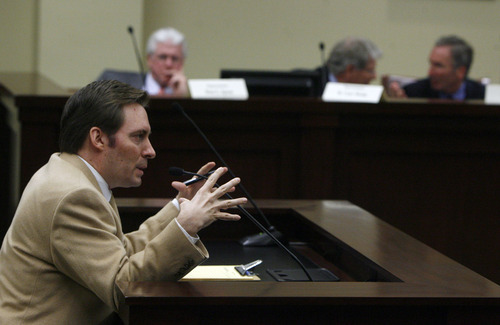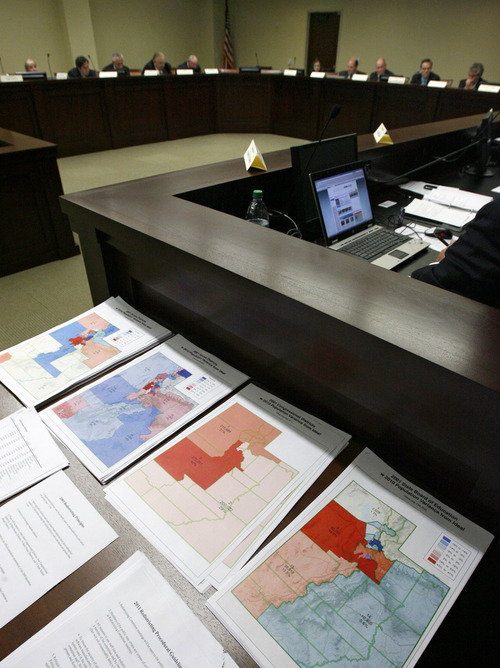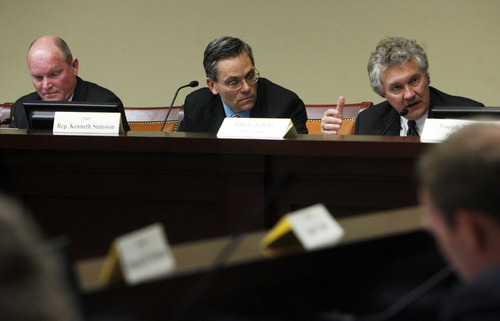This is an archived article that was published on sltrib.com in 2011, and information in the article may be outdated. It is provided only for personal research purposes and may not be reprinted.
Democrats tried several times Wednesday to change how Utah redraws its political boundaries, but Republicans knocked down each attempt in party-line votes.
GOP members of the Legislature's Redistricting Committee rejected attempts to ensure boundaries protect "communities of interest" and that new districts be politically competitive if possible. They also nixed exploring a new type of district that would elect several representatives instead of one through "proportional representation."
The votes came as the committee adopted a list of "redistricting principles" to guide its remapping. The panel ended up with a list nearly identical to one used 10 years ago — including mandates to draw traditionalsingle-legislator districts, with 29 state Senate districts and 75 state House districts. It also will map four U.S. House districts and 15 state school board districts.
Former Utah Libertarian Party Chairman J. Robert Latham proposed perhaps the most radical change — one Democrats liked but Republicans did not.
He asked that the committee consider multi-representative districts — used in many countries and some U.S. cities — which he argued could lead to electing some Republicans in heavily Democratic Salt Lake City or some Democrats in heavily Republican Utah County.
They would be larger than current single-representative districts. He explained that by creating a five-representative district in an area that leans 60-40 Republican to Democrat, it could lead to electing three Republicans and two Democrats. He said voters of both parties would feel that their votes counted to help elect candidates of their choice — unlike the current winner-take-all system.
It also would make it easier for minor parties to win seats. Latham has videos of how the system would work on his website, fairvoteutah.org.
Democrats said the idea was worth at least pursuing, and Rep. Brian King, D-Salt Lake City, proposed that multi-representative districts be considered.
"Utah is near the bottom in terms of voter participation in elections," King said. "One of the reasons for that is that people feel their vote just doesn't matter."
Under the current system, he added, "no one who calls themselves a Democrat in Utah County is represented by anyone in Utah County" in the Legislature.
Rep. Ken Sumsion, R-American Fork, co-chairman of the committee, said parts of the idea are intriguing, but called it "a bit radical" to consider now. He suggested legislators consider making money available to a county or city to try that system locally to see how well it works.
The committee killed the idea, with only its four Democrats voting for it (Democrats also have a vacant seat because Rep. Jackie Biskupski, D-Salt Lake City, resigned from it). Republicans have 14 seats on the panel.
Democrats also sought to make a formal goal of protecting "communities of interest" as much as possible. However, Sumsion and other Republicans said some cities and counties must be divided as the committee draws 75 small state House districts of equal population.
While the GOP also wants to protect communities of interest as much as possible, Sumsion said, including that as a formal guide could lead to lawsuits by people who might contend the committee did not follow its own principles.
Similar arguments were used against a proposal by Sen. Ben McAdams, D-Salt Lake City, to try to make new districts competitive and avoid making safe seats for either political party. Republicans said that would be difficult, given that the committee already had vowed not to put information on state computers such as how partisan areas are.
The panel is developing plans to start public hearings around the state. It hopes to have a final plan by fall and to have the Legislature consider it during a special session.
More on the Web
O An explanation of how a multi-representative legislative district would work is available at fairvoteutah.org.







